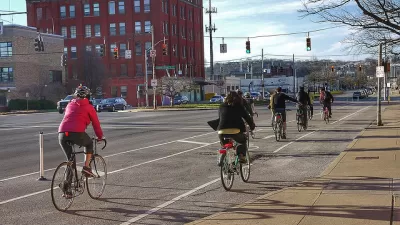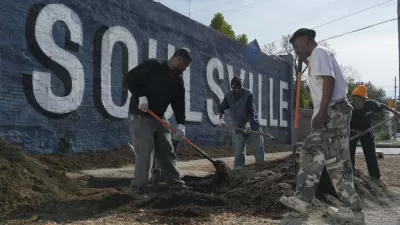Although crowdfunding initially developed to support artists and entrepreneurs, crowdfunding sites are funding a growing number of public space projects.
According to Brady Dale of Next City, since Kickstarter's unveiling in 2009, similar websites for crowdfunding have popped up that specifically focus on civic projects.
Civic technologist and Stanford University doctoral researcher Rodrigo Davies "published the first study of the use of crowdfunding for civic projects. One question he set out to answer was how crowdfunding could be a positive force in community development for communities at all income levels... His research found that 81 percent of civic projects initiated on Kickstarter reached their goals, making these projects more likely to succeed than projects that don’t serve some kind of public purpose. One in five crowdfunding projects across all platforms included in the study explicitly reference benefits for underserved communities."
Indeed, the most common civic project on such crowdfunding websites are open spaces and parks. Dale writes how former New York City Parks Commissioner and current senior vice president at the Trust for Public Land Adrian Benepe often saw, "large, multi-million-dollar projects sit unstarted for want of only thousands of dollars," which these crowdfunding methods can help remedy as either the first or last piece of the funding puzzle.
Benepe added that in his eyes, crowdfunding is a net positive, since "[r]ather than exacerbating inequality, private money enables a city to take public money and allocate it to neighborhoods that have no chance to do private fundraising."
FULL STORY: Crowdfunded Parks Are Coming and That Isn’t a Bad Thing

Planetizen Federal Action Tracker
A weekly monitor of how Trump’s orders and actions are impacting planners and planning in America.

Map: Where Senate Republicans Want to Sell Your Public Lands
For public land advocates, the Senate Republicans’ proposal to sell millions of acres of public land in the West is “the biggest fight of their careers.”

Restaurant Patios Were a Pandemic Win — Why Were They so Hard to Keep?
Social distancing requirements and changes in travel patterns prompted cities to pilot new uses for street and sidewalk space. Then it got complicated.

DC Area County Eliminates Bus Fares
Montgomery County joins a growing trend of making transit free.

Platform Pilsner: Vancouver Transit Agency Releases... a Beer?
TransLink will receive a portion of every sale of the four-pack.

Toronto Weighs Cheaper Transit, Parking Hikes for Major Events
Special event rates would take effect during large festivals, sports games and concerts to ‘discourage driving, manage congestion and free up space for transit.”
Urban Design for Planners 1: Software Tools
This six-course series explores essential urban design concepts using open source software and equips planners with the tools they need to participate fully in the urban design process.
Planning for Universal Design
Learn the tools for implementing Universal Design in planning regulations.
Heyer Gruel & Associates PA
JM Goldson LLC
Custer County Colorado
City of Camden Redevelopment Agency
City of Astoria
Transportation Research & Education Center (TREC) at Portland State University
Camden Redevelopment Agency
City of Claremont
Municipality of Princeton (NJ)




























